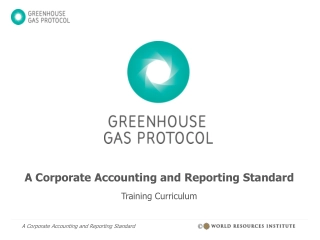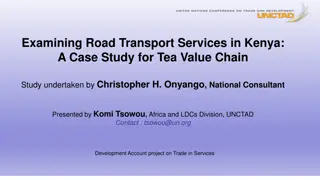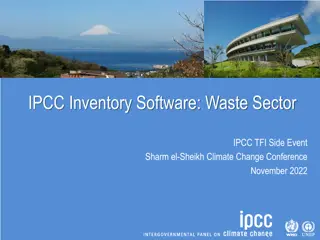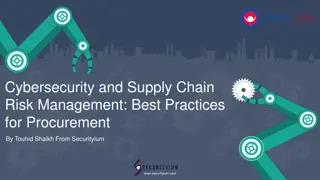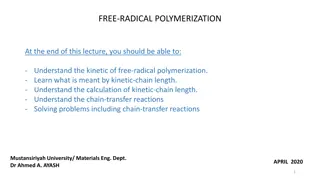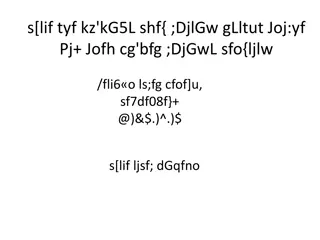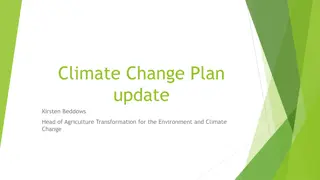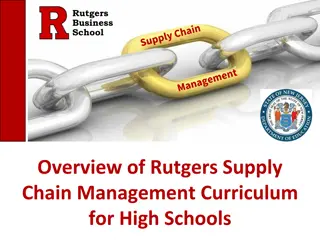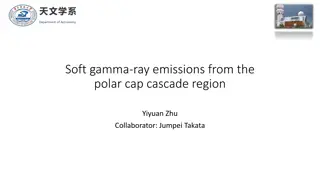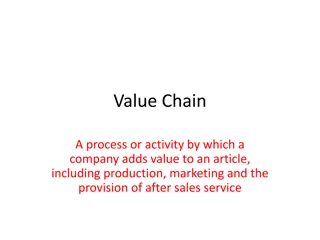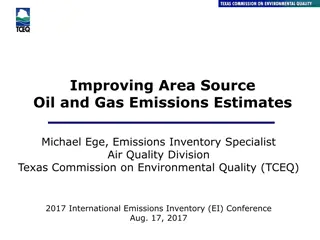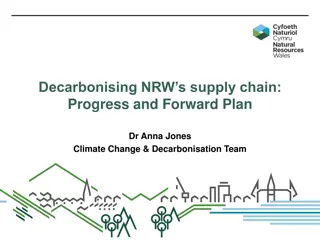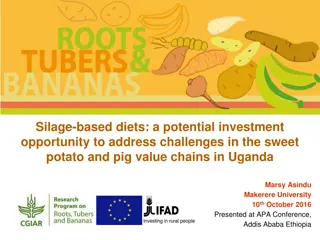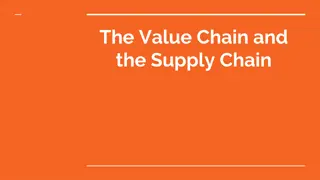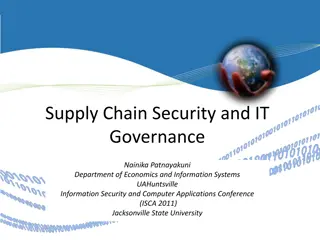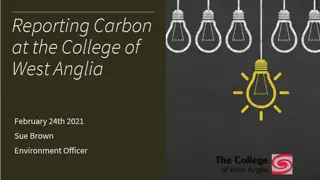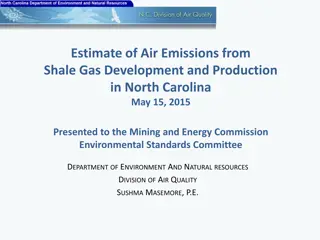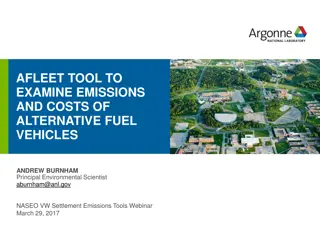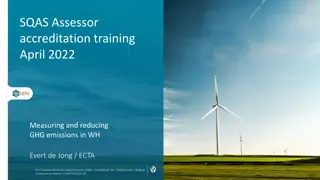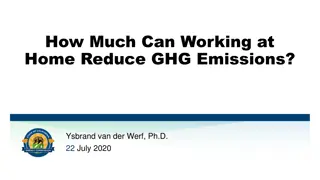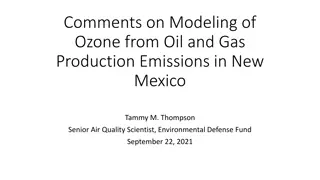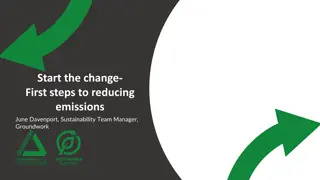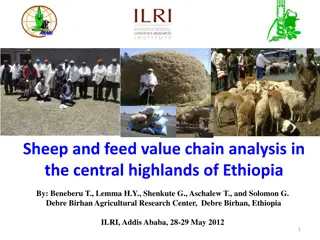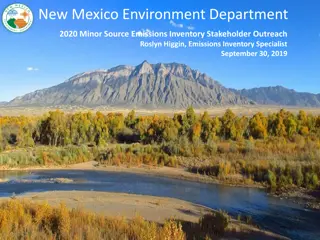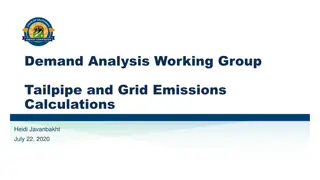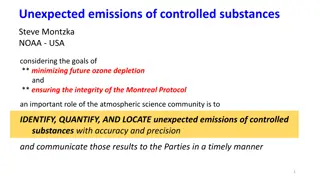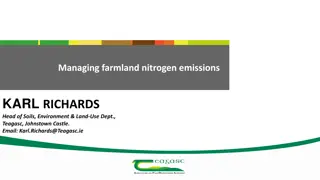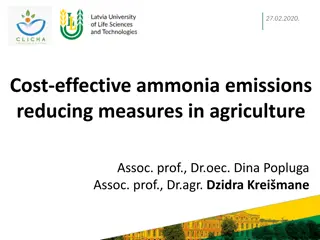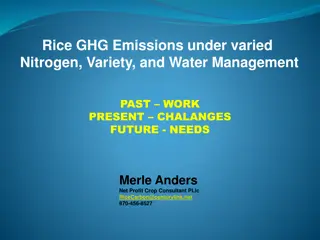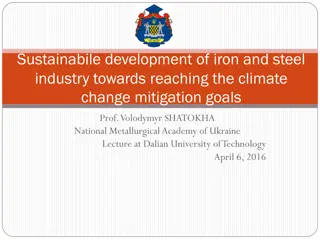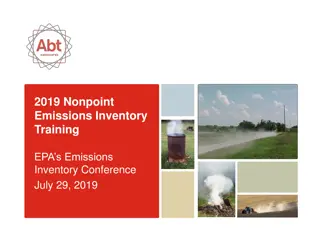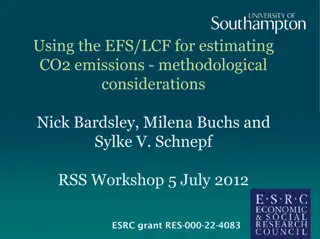A Corporate Accounting And Reporting Standard
Principles and guidelines for preparing GHG emissions inventories, focusing on organizational boundaries, operational boundaries, tracking emissions over time, calculating emissions, and reporting GHG emissions. It emphasizes relevance, completeness, consistency, transparency, and accuracy in accoun
1 views • 14 slides
A Corporate Accounting and Reporting Standard
This training curriculum covers principles of GHG accounting, organizational boundaries, setting operational boundaries, tracking emissions over time, calculating emissions, and reporting GHG emissions. It emphasizes the importance of determining which company operations and emissions sources to inc
2 views • 25 slides
Tradeoffs Between Water Savings and GHG Emissions in Irrigated Agriculture
This study examines the tradeoffs between water savings, economic impact, and greenhouse gas emissions resulting from technological changes in the irrigation industry. Key objectives include estimating water savings for different crops, quantifying GHG emissions from new irrigation technologies, and
0 views • 24 slides
ECC Social Value Reporting and Evaluation Framework
Essex County Council (ECC) has implemented a robust Social Value Reporting and Evaluation framework based on the Local Government Association's National TOMs method. This framework categorizes and assesses social value contributions in two parts - Value Score and Supporting Statement Score - to deri
3 views • 16 slides
Understanding Consumption-Based Emissions Inventories in Boulder County
Consumption-Based Emissions Inventories (CBEIs) play a crucial role in assessing greenhouse gas emissions linked to local consumption patterns. By calculating emissions associated with products and services used by a community, CBEIs reveal significant gaps in traditional emissions tracking, emphasi
2 views • 13 slides
Examining Road Transport Services in Kenya: A Case Study for Tea Value Chain
Context and objectives of a comprehensive study conducted in Kenya to analyze the impact of road transport services on the tea value chain. The study aims to assess the contributions, challenges, and opportunities within the road transport sector and provide policy recommendations for enhancing its
1 views • 20 slides
Understanding Polymer Degradation Processes in Chemistry
Polymer degradation involves a reduction in molecular weight due to various factors like heating, mechanical stresses, radiation, oxygen, and moisture. Two main types of degradation include chain end degradation and random degradation, each affecting the polymer structure differently. Chain end degr
0 views • 12 slides
IPCC Inventory Software Enhancements for Waste Sector Emissions Estimation
Explore the latest enhancements in the IPCC inventory software related to waste sector emissions estimation. Major updates include subnational disaggregation, Tier 3 methods, wetlands supplement, and improvements in worksheet structure and layout. The software allows for detailed estimation of green
1 views • 10 slides
Cybersecurity and Supply Chain Risk Management Best Practices
Supply chain attacks pose a significant threat to software developers and suppliers by targeting source codes and build processes to distribute malware. This article discusses the importance of supply chain risk management, the various attack vectors involved, the industries at risk, and the repercu
0 views • 23 slides
Understanding Free Radical Polymerization Kinetics
This lecture covers the kinetics of free radical polymerization, including initiation, propagation, termination, and kinetic chain length concepts. It explains the calculation of kinetic chain length and chain-transfer reactions. Key points include the rate equations for initiation, propagation, and
0 views • 11 slides
Financial Services Institutions Support Value Chain Actors
Financial services institutions play a vital role in supporting various actors within the value chain, including exporters, wholesalers, banks, processors, and non-bank financial institutions. This ecosystem also involves technical training, business support, local traders, private investors, specia
0 views • 30 slides
Transforming Agriculture for Climate Change: Kirsten Beddows' Vision
Kirsten Beddows, Head of Agriculture Transformation, shares an updated Climate Change Plan focused on reducing emissions, achieving net-zero by 2045, and creating sustainable farming practices. The plan includes over a hundred new policies targeting emissions reduction, land use optimization, and ca
0 views • 9 slides
Rutgers Business School Supply Chain Management Curriculum Overview
Explore Rutgers Business School's innovative Supply Chain Management Curriculum designed for high schools. The curriculum focuses on Project-Based Learning (PBL) and integrates essential elements such as significant content, 21st-century skills, in-depth inquiry, and more. The program is based on th
0 views • 15 slides
Understanding Soft Gamma-Ray Emissions from Pulsar Polar Caps
Soft gamma-ray emissions from the polar cap cascade region are a subject of interest in astrophysics, with studies focusing on the fundamental physical processes of pulsars and potential origins of non-thermal X-ray emissions. Researchers explore the emission processes, polar cap accelerators, casca
0 views • 16 slides
Introduction to Supply Chain Management
Explore the key components of supply chains, the importance of supply chain management technology, and strategies to overcome challenges. Learn about supply chain visibility, the structure of supply chains, and the three segments - upstream, internal, and downstream. Discover how organizations acces
1 views • 29 slides
Emissions Reductions Beyond the Clean Smokestacks Act (CSA) Overview
Emissions Reductions Beyond the Clean Smokestacks Act (CSA) is a comprehensive program aimed at improving air quality by imposing limits on pollutant emissions from coal-burning facilities. The act has successfully achieved significant reductions in nitrogen oxide (NOx) and sulfur dioxide (SO2) emis
1 views • 12 slides
Value Chain Analysis in Agribusiness: Maximizing Value Addition and Product Distribution
Explore the application of the value chain concept in agribusiness by examining input supplies, production processes, wholesalers, distributors, retailers, and consumers for various primary products such as sheep, beef cow, dairy cow, and more. Understand the value-added products, processing methods
0 views • 5 slides
Enhancing Oil and Gas Emissions Estimates for Area Sources
This presentation by Michael Ege, an Emissions Inventory Specialist at the Texas Commission on Environmental Quality (TCEQ), focuses on improving area source oil and gas emissions estimates. It covers the methods used to estimate emissions, including the development of basin-specific equipment profi
0 views • 31 slides
Decarbonising NRW's Supply Chain Emissions: Progress and Challenges
Dr. Anna Jones and her team are spearheading efforts in Wales to achieve net zero emissions by 2050, with a focus on decarbonising NRW's supply chain and the public sector. The Welsh public sector aims to collectively reach net zero by 2030, with a strong emphasis on reporting and reducing emissions
0 views • 10 slides
Potential Investment Opportunity in Sweet Potato and Pig Value Chains in Uganda
Silage-based diets offer a promising investment opportunity to address challenges in sweet potato and pig value chains in Uganda. The study focuses on assessing the production and utilization of sweet potato products, mapping out the value chain, estimating wastage, and identifying opportunities for
0 views • 16 slides
Understanding the Value Chain and Supply Chain Dynamics
The value chain involves adding value through a series of activities from producer to consumer, focusing on meeting consumer demands and gaining a competitive advantage. On the other hand, the supply chain focuses on efficient and cost-effective product distribution to meet consumer needs. The prima
0 views • 10 slides
Enhancing Supply Chain Security and IT Governance: An Overview
This presentation delves into the critical aspects of supply chain security and IT governance, highlighting the synchronization of IT decisions across supply chains, global supply chain concerns, the cost implications of supply chain security lapses, and the need for more research and strategic alig
0 views • 28 slides
Corporate Energy Disclosure Requirements and Methodology
Corporations making energy disclosures on a college website by March 31st, 2021, must include annual UK energy use data, greenhouse gas emissions, methodology used, energy efficiency measures, and emissions intensity ratios. The disclosure covers Scope 1, 2, and 3 emissions, business travel, and met
0 views • 23 slides
Overview of Air Emissions and Quality Assessment in Shale Gas Development
The presentation discusses the estimation of air emissions from shale gas development and production in North Carolina, highlighting the importance of analyzing emissions from oil and gas activities and associated truck traffic. The process involves building emissions inventory, photochemical modeli
0 views • 22 slides
AFLEET Tool for Examining Emissions and Costs of Alternative Fuel Vehicles
AFLEET is a tool developed by Argonne National Laboratory to analyze the emissions and costs of alternative fuel vehicles. It provides insights into the benefits of using different fuel technologies and helps in decision-making for vehicle fleet management. The tool includes calculations for emissio
0 views • 25 slides
Greenhouse Gas Emissions Management in Warehouse Operations
The SQAS Assessor accreditation training in April 2022 focused on measuring and reducing greenhouse gas emissions in warehouse operations. The content covers emission questions, scope of emissions, energy consumption examples, disaggregation of emissions, emission intensity calculation, and strategi
0 views • 17 slides
Potential Reduction of GHG Emissions by Working at Home
This analysis explores the impact of increased remote work on reducing greenhouse gas emissions, particularly in the context of the COVID-19 lockdown. By examining workforce data, commuting patterns, and emission statistics in California, the study aims to quantify the potential decrease in GHG emis
0 views • 15 slides
China-Africa Supply Chain Cooperation: Challenges and Opportunities
China-Africa Supply Chain Cooperation presents both challenges and opportunities for development. The growth of China-Africa supply chain is crucial, considering Africa's participation in the global supply chain mainly focused on providing primary products. The strategic importance of this relations
0 views • 19 slides
Modeling the Impact of Oil and Gas Emissions on Ozone in New Mexico
Tammy M. Thompson, a Senior Air Quality Scientist at the Environmental Defense Fund, discusses the modeling of ozone from oil and gas production emissions in New Mexico. The analysis focuses on areas with high ozone concentrations and their overlap with oil and gas regions, highlighting the sensitiv
0 views • 8 slides
Taking the First Steps to Reduce Business Carbon Footprint
Initiating efforts to reduce business carbon footprint involves identifying emission sources, analyzing energy consumption, and implementing strategies to measure and track emissions. This involves understanding where emissions originate from, gaining insights into the numbers through consumption da
0 views • 21 slides
Sheep and Feed Value Chain Analysis in the Central Highlands of Ethiopia
Smallholder farmers in the central highlands of Ethiopia rely on sheep for both subsistence and income generation. This study analyzed the sheep and feed value chain, identified market dynamics, and assessed constraints and opportunities. The research area, methodology, results, and key actors in th
0 views • 15 slides
Understanding Emissions Inventory for Air Quality Management
Emissions inventory plays a crucial role in monitoring air pollutant discharges and assessing air quality. This article discusses the purpose of emissions inventory, distinguishing between actual and permitted emissions, and provides guidelines for preparing and reporting minor source emissions inve
0 views • 15 slides
Demand Analysis Working Group: Tailpipe and Grid Emissions Calculations Overview
This report discusses the methodology for calculating tailpipe emissions using vehicle stock and VMT data, along with grid emissions from charging PEVs. Challenges include differences in vehicle classifications and lack of trip forecast calculations. Mapping LDVs from CEC classes to EMFAC classes wa
0 views • 10 slides
Monitoring Unexpected Emissions of Controlled Substances for Ozone Protection
The atmospheric science community plays a crucial role in identifying, quantifying, and communicating unexpected emissions of controlled substances to support the goals of minimizing future ozone depletion and upholding the Montreal Protocol. By comparing observation-based estimates of global emissi
0 views • 13 slides
Managing Farmland Nitrogen Emissions: Strategies and Research Updates
Soils play a crucial role in greenhouse gas emissions and carbon sequestration. Karl Richards, Head of Soils, Environment & Land-Use Department at Teagasc, discusses the importance of managing farmland nitrogen emissions through various practices. Research focuses on reducing emissions and enhancing
0 views • 8 slides
Cost-effective Measures to Reduce Ammonia Emissions in Agriculture
Cost-effective strategies to reduce ammonia emissions in agriculture are crucial in Latvia, where a significant portion of emissions originate from the agricultural sector. The study focuses on potential measures, such as precise mineral fertilizer application, improved manure management, nitrogen f
0 views • 13 slides
Rice GHG Emissions under Varied Nitrogen, Variety, and Water Management Study in Arkansas
Detailed study on rice greenhouse gas emissions under varied nitrogen, variety, and water management treatments, focusing on nitrogen fertility, crop varieties, and water usage impact on methane and nitrous oxide emissions. Research examines optimal nitrogen rates for reduced global warming potentia
1 views • 18 slides
Sustainable Development of Iron and Steel Industry for Climate Change Mitigation
The lecture by Prof. Volodymyr SHATOKHA discusses sustainable development in the iron and steel industry to meet climate change mitigation goals. It examines current global climate targets, the role of the industry in greenhouse gas emissions, and the feasibility of reducing emissions. The study foc
0 views • 27 slides
Understanding the Nonpoint Emissions Inventory Training Conference
The Nonpoint Emissions Inventory Training Conference held by the EPA provided valuable insights into nonpoint sources of emissions. Sessions covered topics such as NEI definition, previous processes, and developments in the 2017 NEI process. Tools like NEMOs and the Wagon Wheel were introduced to im
0 views • 53 slides
Methodological Considerations in Estimating CO2 Emissions Using EFS/LCF
Various studies have utilized the EFS/LCF in the UK to estimate household emissions and policy impacts. This involves converting expenditures into emissions, which presents methodological challenges such as infrequent purchases and variations in data sources. The comparison of household CO2 emission
0 views • 17 slides

